What to watch? Choosing between Song Kang’s “My Demon” or Jang Dong-yoon’s “Like Flowers in Sand” was easy. It was a quick pass on the latter because I thought its vibe was run-of-the-mill drama compared to the former’s aura reminiscent of American TV show “Lucifer.”
But I was mistaken. My interest in “My Demon” fizzled out swiftly despite Song Kang playing the pulchritudinous demon.
Jang Dong-yoon, on the other hand, was a golden find with his portrayal of wrestler Kim Baek-du. Intertwining Baek-du’s story with an unsolved town murder against the backdrop of ssireum, Korean wrestling, made the 12 episodes of “Like Flowers in Sand” engaging.
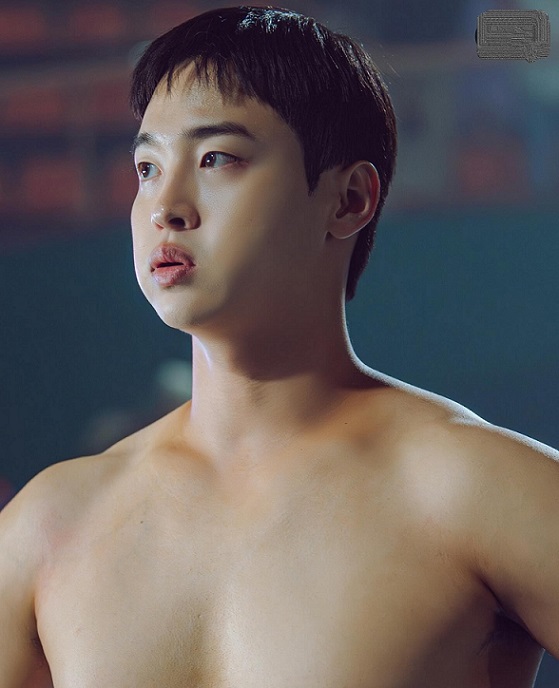

Ssireum, an intangible cultural heritage, rides high on the never-ending hallyu (Korean Wave). Hallyu is Korea’s “soft power” to diplomatically maintain its presence and advance its foreign policy objectives through K-drama, music (K-pop), clothes (hanbok), food (kimchi), and fan clubs.
Cultural content
K-drama led Korea to the global stage in the 1990s. Its popularity in Japan, China, Indonesia, Malaysia, and Thailand formed a cultural affinity in the region, encouraging then President Kim Dae Jung to invest in cultural products, said Sumeyye Dilara Dincer in www.aa.com.tr.
Kim’s brainchild became a “cultural policy handed down to subsequent administrations,” with the Ministry of Culture, Sports, and Tourism (MCST) implementing the policies “through special companies and within the ministries.” The Korea Creative Content Agency (KOCCA), a key organization under MCST, has played a significant role.
“KOCCA stands out because there are diverse units encompassing all industries. There are various subunits that include Internet comics, design, dramas, music, cuisine, graphics, and animations [providing] a range of opportunities to promote cultural content,” said Dincer, quoting Mutlu Binark, a professor at Hacettepe University doing fieldwork on Korean culture in South Korea.
Cultural content is seamlessly woven in K-dramas. Kimchi is ubiquitous in dining scenes. Recently, it was a tool of revenge in “Welcome to Samdal-ri,” with Cho Sam-dal pouring spoiled kimchi — a soupy version from Jeju — over her cheating boyfriend’s head.
The hanbok from the Joseon era (1392-1897) has been popularized in historical K-dramas, i.e., “Captivating the King,” “The Tale of Nokdu,” “Mr. Queen” etc. (Hereabouts, outside of K-drama, the Korean Cultural Center in Taguig City has an exhibit on the hanbok and other Korean artifacts. Guests can wear the hanbok through an interactive kiosk.)
The latest K-drama cultural content is ssireum, a form of wrestling done on sand in any space like a gym or stadium. It has two players pushing each other to the ground while holding the satba, a long cloth belt tied to the waist and a leg. The adult winner of the final game “is awarded an ox, symbolizing agricultural abundance, and the title of jangsa (champion),” said ich.unesco.org.
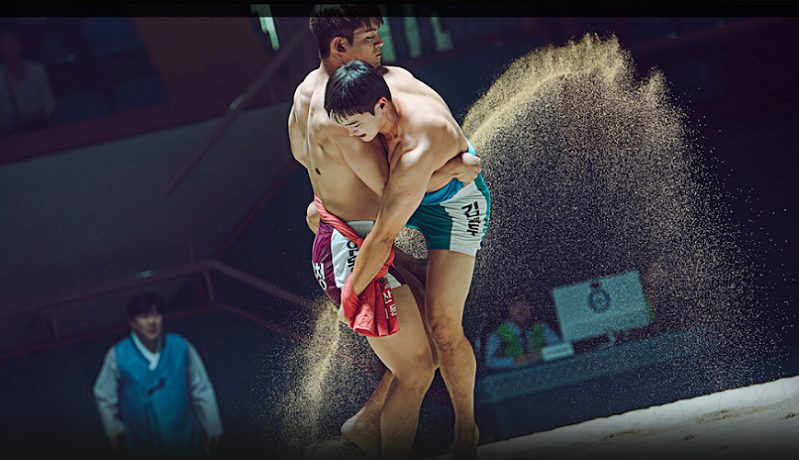

Per www.wsj.com, ssireum and sumo wrestling are similar except for the point system. Sumo wrestlers win by shoving the opponent outside the ring while ssireum wrestlers lose when any part of their body above the knee touches the ground.
Family ties
The usual setting of cosmopolitan Seoul is replaced with provincial Geosan in “Like Flowers in Sand,” a city with a strong communal sense of tradition and relations. Ssireum kept the Geosan folks together because of its intrinsic social function of gathering everyone to strengthen ties and enhance solidarity.
Per ich.unesco.org, everyone’s exposed to ssireum. Children learn wrestling from family members, a process that local communities reinforce by holding annual wrestling tournaments.
Families like Baek-du’s have devoted their lives to ssireum. Kim Tae-baek, Baek-du’s father, is a ssireum legend respected by the community despite his son not having won any jangsa title, unlike four-time jangsa holder Kwak Jin-su, Baek-du’s childhood friend and rival.
Baek-du’s early retirement without a jangsa grieved Tae-baek. It was as if his son was thumbing his nose at him, but he bore it stoically. Compounding his grief was the fact that Baek-du, actually a wrestling prodigy, couldn’t defeat him in a practice match. Nonetheless, Tan-baek and his family still turned up to support Baek-du in his challenge match against Jin-su for the position of head coach of the Geosan County Office Ssireum Team.
The town also collectively grieved Baek-du’s retirement, their feelings alternating between pity for him and his family and regret over his wasted talent and reputation as ssireum royalty. Ssireum is about solidarity, so why was Baek-du only thinking of himself?
Geosan was breaking up because of ssireum until an outsider, but not totally a stranger, arrived and prevented its complete disintegration. Oh Du-sik returned as Oh Yu-geong and, as part of her undercover police work, became Baek-du’s team manager. She was the catalyst that made Baek- du rediscover his passion for ssireum and kept the team from disbanding.
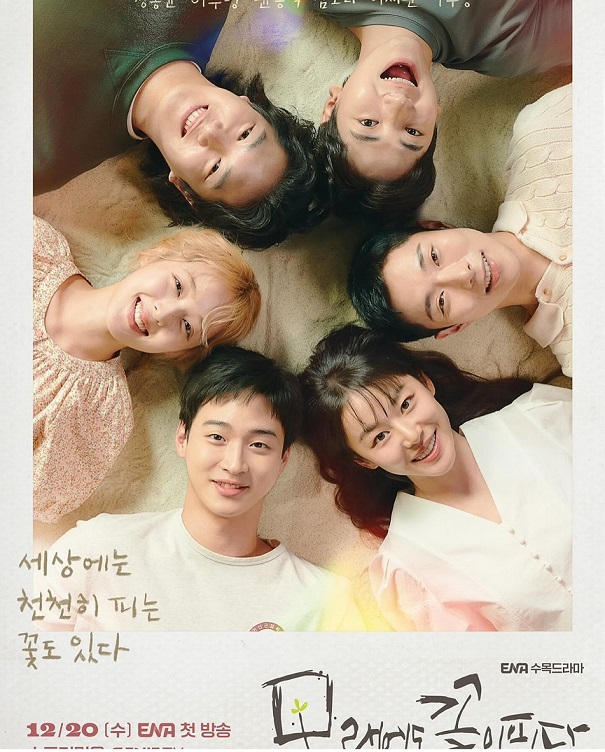

Community care
Everyone is in everyone else’s hair in Geosan. It’s the community’s way of giving love and support. The townsfolk didn’t dissuade Baek-du or pressure his family to talk him out of his new career move. But they didn’t hesitate to berate Baek-du when rumors swirled about his alleged affair with Du-sik, who was also working undercover as a married woman.
Officer Cho Seok-Hui never tired of looking for and returning a neighbor’s dog. He supported Baek- du, his best friend, in becoming a police officer by lending him his reviewer for the police recruitment exam.
Using her love language of bluntness, Du-sik knocked some sense into Baek-du, calling out his bluff of losing interest in ssireum and pointing out the flaws in his technique. She got through to him because she listened to him.
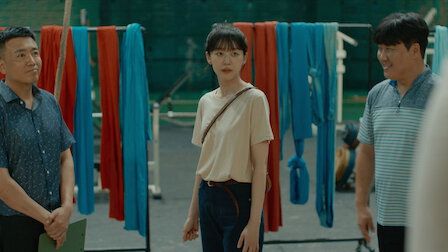

There’s a lesson on listening to be learned from Meg, a counselor and author of the book “Dear Meg,” published in the Philippines by Gantala Press. Writes Meg: “Listening is so much more than hearing words properly. When we truly listen, we realize that what’s not being said is sometimes more important that what is. Listening with compassion also means not asking questions just so we can complete the story in our heads… [The] goal is…to help them see what their journey is about.”
When solidarity is a priority, petty squabbles are resolved. The mothers of Jin-su and Baek-du patched things up and were back to shooting the breeze over soju. Jin-su’s mother antagonized Baek-du’s mother, rallying the townsfolk to support Jin-su in the challenge match.Geosan has what Meg calls the soup-making model of nurturance as opposed to the token exchange model. Citing from an article by Nora Samaran, Meg explains that token exchange has people keeping track of the care given, passing tokens back and forth. With soup-making, people don’t keep scores, but contribute towards a pot of shared feelings of connection, intimacy, trust, and safety.
Meg adds, quoting Samaran: “It’s not 50-50. It’s not ‘give and take. It’s 100-100, all in for all.”
Out in the cold
But just as community care quickly envelops one in a safety net of warm feelings, it can unceremoniously kick one out in the cold in a snap. Mi-ran’s father, a ssireum wrestler, was murdered and everyone suspected Du-sik’s father, Oh Jun, of the crime because of the altercation they had. Inevitably, the incessant whispers in the grapevine forced Jun and Du-sik to leave Geosan. Their departure traumatized Baek-du, who, in a scene, bawled while running after the van that sped away carrying his friend. Mi-ran simply vanished.
Baek-du carried that painful separation in him for two decades, not knowing what happened to Du-sik or where she was. Everyone, including his family, expected and assumed that his silence meant he’d moved on. Coming face-to-face with Du-sik released his bottled-up feelings.
Similarly, the return of Du-silk and Mi-ran opened the floodgates of guilt of the Geosan folks for, one, convicting Jun of murder by gossip: two, not speaking up for the innocent, (Tae-baek believed in Jun’s innocence but kept quiet); and, three, abandoning young Du-sik and Mi-ran.
Like a bad habit, the womenfolk were doing to adult Du-sik and Mi-ran what they did decades ago. They were chagrined at Mi-ran’s different hair color and attitude. She opened her café only when she felt like it. She didn’t socialize with the women and chatted only with Jin-su, who frequented her café. Meanwhile, the women glared disapprovingly and gossiped about Du-sik because they found her walkabouts under an umbrella unacceptable. They stopped nitpicking on her behavior when they met her “husband” Min Hyeon-uk — her undercover police partner — and were smitten by him.
Similarly, the ssireum team was hostile towards Du-sik. They belittled her capability to manage the team, assuming she lacked knowledge in ssireum. Much to their amazement, she expertly flipped and threw down a team member twice her size effortlessly.
Complex wrestler
Baek-du’s character elicited a gamut of reactions. He was pitiable because he was without a jangsa title, but, at the same time, admirable for his dedication to the sport despite his dismal record. He showed up for training every day, bearing the scolding and punishment of running additional laps after receiving training from coach Jin-su.


His kindness was his strength, but also his undoing. Frustratingly, he was quick to share his signature ssireum move with teammates like Lim Dong-seok — before he transferred to another team — who used it against him in a match and won. Incredibly, he didn’t begrudge Dong-seok that victory.
Thinking Baek-du was a dimwit was easy. He was innocent, clumsy, inarticulate, and he constantly talked to himself. However, this facade of slowness belied an intelligence that only Hyeon-uk saw. Baek-du knew when to concern himself with stuff that concerned him and vice versa. Self-talk was his way of thinking things through — i.e., what happened after his drunken blackouts, elder Park Pil-du’s suspicious behavior, Du-sik’s false identity, the death of the ssireum match fixer — to arrive at the truth.
His conversations with himself didn’t resolve his trauma of losing Du-sik, but they helped him unmask her true identity, learn her purpose in returning to Geosan, and solve a 20-year-old cold murder case.
Versatility
Jang portrayed Baek-du’s complexity and physicality brilliantly. To get the wrestler’s physique and speech pattern, he bulked up, gaining 14kg by constantly eating pizza, and learned Gyeonsang, the primary dialect spoken in the drama, said www.dojeonmedia.com. (Gyeonsang is spoken in the Yeongnam region and cities of Busan, Daegu, and Ulsan.)
His transformation in “Like Flower in Sand” was remarkable. It brought to mind “The Tale of Nokdu” in which he played a woman who slipped into a widows’ village to learn about his origin; he went about the role convincingly, without caricaturing women.
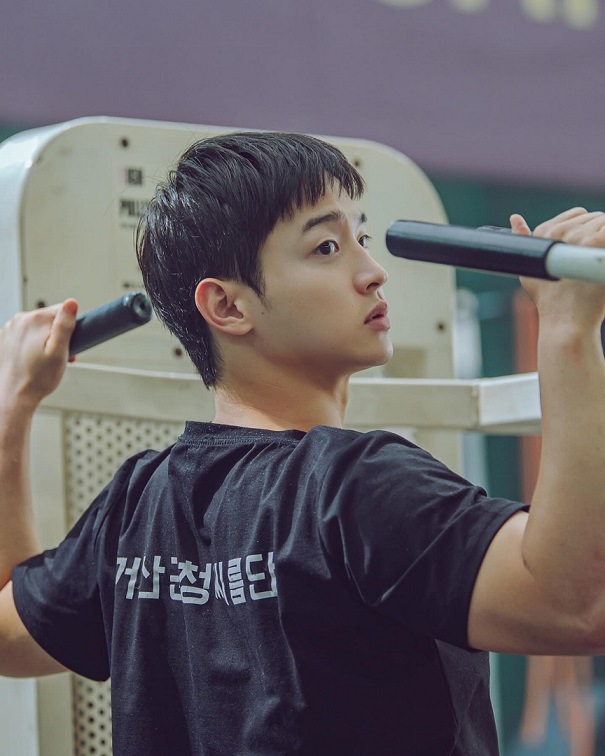

Jang conveyed Baek-du’s emotions with controlled, nuanced expressions. He exuded child-like innocence when his sixth sense kept telling him Yu-geong was Du-sik, which she repeatedly denied and he rebutted. He showed restrained indignation when he reprimanded the gossipmongers for their talk about him and Du-sik, insinuating that his parents didn’t raise him well. He reminded them that it was precisely their mean frivolity that led to Du-sik’s departure.
He lived up to the title of wrestling prodigy, climbing the tournament’s score board alone match after match when his whole team was felled by food poisoning. He was a pro in the ring, brimming with confidence and happiness. He was disappointed when Du-sik left the tournament and ghosted him.
Flowers in bloom
“Like Flowers in Sand” is a cultural heritage tour that revives a weary soul with glimpses of how life can be. Faith in humanity, for instance, is restored briefly with the love and support that a community gives one another. Geosan folks reflect what Meg hopes others would: “[resisting] the capitalist exhortation to look at caring as crude token exchange, but as jolly contributors to the making of soup that nourishes us all.”
Hope, which is pitifully lacking these days, is shored up through the happy turn of events marked by the blossoming of Geosan’s flowers. Baek-du won a jangsa as well as a relationship with Du- sik. Du-sik solved the murder case, restoring her father’s good reputation. She and Mi-ran, still running her café, cleared the air while Jin-su and Baek-du were slowly mending their friendship.
The message of justice — elusive in many places — triumphing resounds loudly. Gossipmongers are properly chastised. Elder Pil-du is cleared of suspicion, and he and Tae-baek are absolved of the guilt of their friend’s murder. Finally, the murderer of Mi-ran’s father — Lee Gyeong-mun, a Geosan market vendor — and the ssireum match fixer are caught.
In the reality vs. expectation trap, “Like Flowers in Sand” is the expectation — supportive community, true friends, passion — that people wish to be reality instead. It is possible with hallyu magic that make flowers bloom even in the most adverse clime.


